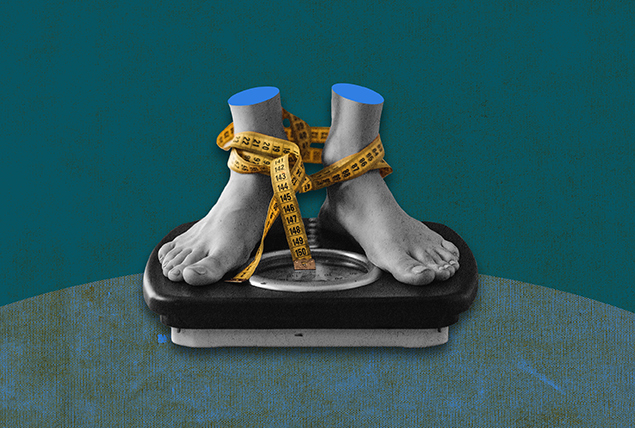Living and Dating With Bulimia Nervosa

Bulimia nervosa is an eating disorder characterized by binge episodes and compensatory behaviors, such as abusing laxatives and diuretics, self-induced vomiting, overexercising and restrictive eating. Bulimia nervosa is a serious mental health condition that impacts every aspect of your life, including dating.
This disorder can pose risks to heart health, pregnancy and mental health, as well as cause a negative impact on sexual health. Overeating and purging are often followed by feelings of guilt and remorse.
In a ratio of 3 to 1 females to males, it's estimated by the American Addiction Centers that as many as 6 million people experience bulimia nervosa at some point during their lifetime.
Eating disorders in general are reported to cause low sexual desire alongside feelings of anger, anxiety, depression and disillusionment. Bulimia nervosa is also specifically linked to disordered relationships, because sufferers may withdraw from others as food becomes their only obsession. Binge eating can lead to control issues, which in turn can lead to sexual impulsivity and a lack of enthusiasm for frequent or consistent sexual behavior.
Let's explore how bulimia nervosa impacts your day-to-day life and dating—including how to tell a partner or date about your condition—and how to support a loved one with bulimia nervosa.
How does bulimia nervosa impact everyday life?
Bulimia nervosa impacts everything about your everyday life, according to Melissa Spann, L.M.H.C., the chief clinical officer of Monte Nido & Affiliates in Miami. While the distinguishing characteristics of bulimia nervosa are binge episodes in which you feel out of control and engage in compensatory behaviors, someone with bulimia nervosa is constantly preoccupied with thinking about food and their own body shape or size.
"You're missing everything," Spann explained. "Someone who has an internal dialogue that is hyper-focused on 'when is the next time I am going to eat,' 'what is it going to be that I'm going to eat,' and 'what am I going to do after I eat,' that's certainly the opposite of living an authentic 'in the moment' life."
Regardless of what stage you are at in your life, bulimia nervosa can prevent you from being able to fully engage in your relationships, interests, hobbies and everyday life. Spann said someone with bulimia nervosa often experiences a massive amount of shame around eating and purging, and being stuck in this cycle of shame can make it difficult for a person to be present in their everyday life.
For college students, having bulimia nervosa might cause them to isolate themselves in their dorm instead of going out and making friends.
"For someone in their 40s, it might mean not wanting to do something or even engaging with their kids because they are, again, in their own shame cycle," Spann said.
Bulimia nervosa can take someone out of their everyday life and make it difficult to engage with their loved ones, including their kids, because they feel an intense need to engage in compensatory behaviors, such as exercising.
For example, a function of their eating disorder may be that they can't start their day unless they run 10 miles in the morning, according to Spann. These behaviors can be a serious issue that gets in the way of being able to be present with family, friends or even interests and work. They may isolate and opt not to go to social events such as parties or dinner with friends, especially if food will be involved.
"You are missing out on life's opportunities when you're stuck in that really vicious cycle of your own mind," Spann explained.
Dating with bulimia nervosa
Bulimia nervosa impacts every aspect of your day-to-day life, which means it can affect your romantic and sexual relationships, too. For starters, going on dates can involve food, which can be deeply anxiety-inducing for someone with bulimia nervosa. It could even cause them to avoid dating altogether.
Meeting new people while dating not only exposes your own insecurities about your appearance but also what others think of you. This can expand the already overwhelming concerns a person with bulimia nervosa typically has about their body shape, size and appearance.
If you live with bulimia nervosa, you may have a difficult time feeling comfortable getting close to someone new. Typically, an element of living with bulimia nervosa is keeping secrets. Feeling that you need to hide a part of yourself can make it difficult to feel comfortable getting close to someone.
If you're in a long-term relationship, having bulimia nervosa may feel like you need to hide that part of yourself from your partner. It may be difficult to feel present in the relationship because you're distracted by overwhelming feelings of shame or preoccupied with thoughts about food.
How to communicate about your eating disorder
Everyone has different preferences for telling their long-term partner or someone they're dating about their eating disorder. Disclosing your eating disorder—or perhaps if you don't have a diagnosis, your struggle with body image and food—can make you feel vulnerable.
When it comes to dating, Spann explained that if you're seeking treatment, you may want to talk with your provider about the risks of starting a new relationship early on in your recovery. In general, opening up to someone you're dating about your eating disorder depends on how you show up in your own life.
"I do think that if there's something you're struggling with, we want to acknowledge where our struggles are," Spann said. "I believe very strongly that relationships are the way to heal."
She noted that disclosing your struggles with your partner can be a very important aspect of the healing process, especially in long-term relationships.
"That's sort of the cornerstone for me in terms of finding a place of recovery is having healthy and meaningful relationships," Spann added. "Having a conversation with a partner about your eating disorder is the basis and the foundation of taking away shame, secrecy, and the hiding and all of the vicious things that pile on top."
Exactly how you disclose your eating disorder to a partner depends entirely on what is most comfortable to you. If you're working with a therapist, they can prepare you for the conversation. You can also ask your therapist to have a joint session with your partner so you have support with the conversation. Even if your partner doesn't know you're in therapy, your therapist can help you plan how to bring your partner in for a session together.
"My experience, nine out of 10 times, is that the [long-term] partner already knew and they were waiting for the individual to say something or didn't know how to address it," Spann said.
If you're not working with a therapist, consider starting out by telling your partner you want to have a conversation, such as, "There's something I want to talk with you about, and I feel really nervous because it's personal and vulnerable to share." You might tell them you have been diagnosed with an eating disorder and you're seeking treatment. Or you may say you're struggling with your mental health and need their support.
In terms of disclosing to someone you're newly dating, you might say something like, "I have an eating disorder and recovery is a big part of my life right now. I want to tell you because I'm enjoying dating you, and in order to build an authentic relationship with someone, I need to feel comfortable being myself."
Supporting someone with bulimia nervosa
Watching a loved one struggle with bulimia nervosa can be intimidating. You may want them to get help more quickly than they do, or perhaps you've been trying to support them and they have been resistant to your help.
"It's not easy. We want to tell parents, partners and caregivers it's really, really hard to try to support someone, especially if you feel like you've been living on eggshells," Spann said.
She explained that it's important for the individual with bulimia nervosa to seek support and for the caregivers to get help themselves, too.
Plenty of information is online. The National Eating Disorders Association (NEDA), for example, has resources on how to talk to a loved one about eating concerns, starting with learning accurate information about eating disorders, weight and exercise.
NEDA recommends that knowing the facts can help you reason with your friend about any inaccurate ideas that may be fueling their disordered eating patterns. There are also outlines for several steps you can take when planning to have a conversation with a loved one about eating concerns, such as being sure to use "I" statements. Suggestions are also made to focus on behaviors that you have personally observed, such as, "I have noticed that you aren't eating dinner with us anymore" or "I am worried about how frequently you are going to the gym," rather than "You're not eating! You're exercising too much!" which can cause anyone to feel defensive.
If you're supporting someone with bulimia nervosa, remember to get support for yourself, too. Talk with friends about what you're feeling or join an online forum or support group. If you can, see a therapist who can support you with what you're going through.
Resources for patients and caregivers
There are a number of resources for people with bulimia nervosa and for their caregivers.
- The NEDA Helpline can be reached via phone, text or online chat 24/7 and provides support, resources and treatment options for you or a loved one. You can call or text 800-931-2237. The website has a robust library of accurate information on all types of eating disorders, eating, weight, exercise and how an eating disorder impacts health and life. Also, look for toolkits for parents, educators, coaches and trainers to educate these groups on eating disorders.
- Use a Google search for local therapists and eating disorder treatment centers near you. There are likely to be individual therapists in your area, as well as institutions or centers that have inpatient or outpatient recovery programs that can perhaps direct you to local resources.


















